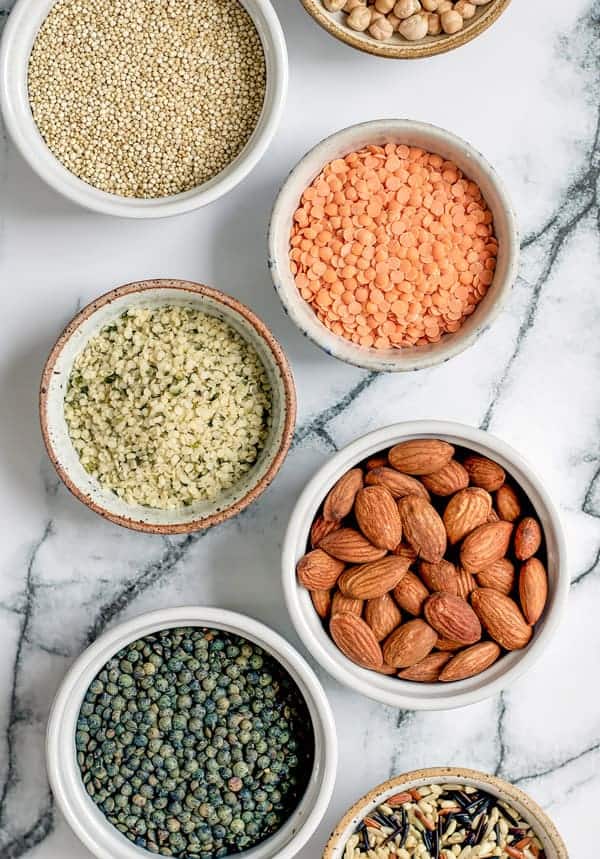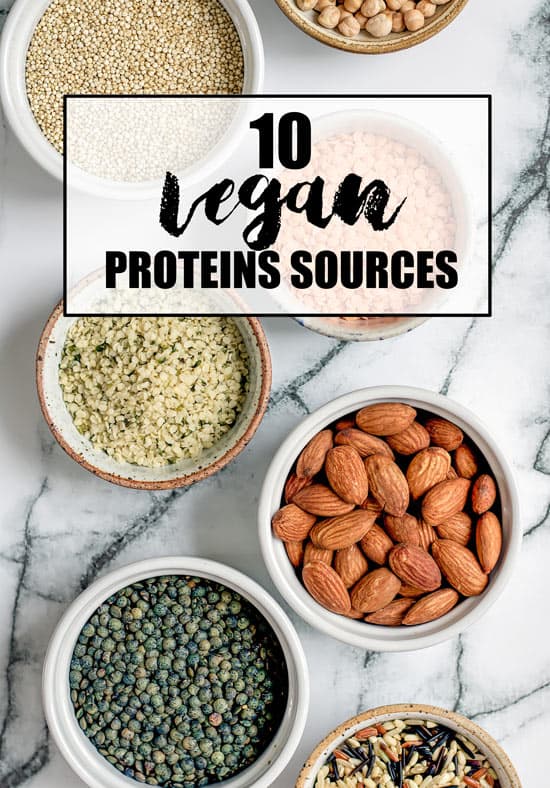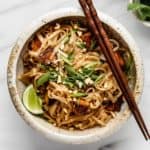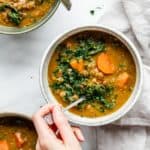10 best plant-based protein sources
Today I wanted to share with you the 10 best plant-based protein sources.
Now there are definitely some other great plant-based protein sources out there besides the list below, but these are some my favorites that have a high concentration of protein and are easy to use in cooking and recipes!

I’m sure you’ve heard the age-old question about a plant-based lifestyle: “where do you get your protein from?”
Well, it’s actually quite easy to get in your daily intake of protein through plants! There’s been a common misconception, especially with many fad diets or low-carb diets, that you need a TON of protein in a day. Today more and more people are learning that this is not true!
The average recommendation for protein intake is approximately 0.8 grams of protein per kilogram of body weight.
Now, don’t get me wrong, if you are bodybuilding, or do a lot of weight-based exercises, yes, you probably will need more protein than the average person.
I am also a strong believer in the fact that everyone is different, and therefore each individual’s body will have different needs. Being in tune with your body is so important to make sure you’re fueling yourself with what you need, and only you can know that!
So go ahead and consume as much protein, and whichever sources you know is best for your body.
Here is a list of some of my favorite plant-based protein sources that I love to eat on a regular basis to leave me feeling at my best!
Please note that the nutritional information listed is estimates.
10 best plant-based protein sources
1. Hemp seeds
These are a staple in my daily diet. They’re high in omega 3 fatty acids and have a light nutty flavor. You can sprinkle them on pretty much anything!
3 tbsp has 10 grams of protein
2. Lentils
Lentils come in a wide variety of types that all have slightly different tastes and textures. They’re a great source of fiber and easy to cook into a wide variety of dishes like soups, and chilis!
1 cup has 18 grams of protein
3. Chickpeas
Chickpeas make a great meat replacement in a lot of dishes like stews and curries. They can also be made into a creamy delicious hummus dip or falafel!
1 cup has 14.5 grams of protein
4. Beans
There is such a wide variety of beans to choose from! Kidney beans, lima beans, black beans, and the list goes on! Lentils, chickpeas, and beans are all part of the legume family, but I like to consider them differently as they all have quite different textures, tastes, and great uses for different types of dishes.
1 cup has 16 grams of protein (*may vary slightly depending on the type bean)
5. Almonds (and other nuts)
Oh how I love almonds! One of my favorite snacks to grab on the go, take on flights or long car drives. All nuts contain a good amount of protein, but I like almonds in particular as they have a higher concentration of protein than many other nuts. (I also love making homemade almond milk with them!)
1/4 cup has 7.5 grams of protein
6. Chia seeds
I mean…as if I was going to leave this off my list! These powerful little seeds are packed with nutrients and so easy to throw in/on anything your eating. They can also be turned into a delicious pudding.
7. Spirulina
Spirulina is an algae that is a great source of antioxidants and protein. It has many B vitamins and boosts the immune system. While it does have a bit of an algae taste, (to be honest I’m not the biggest fan of the taste) you can also get spirulina in capsules instead of a powder form. (My preference!)
1 tbsp has 4 grams of protein
8. Pumpkin seeds (and other seeds)
All seeds are a good source of protein, but one of my favorites (and also one of the highest in protein) are pumpkin seeds! I love adding them to salads, granolas, and trail mix.
2 tbsp has 6 grams of protein
9. Quinoa
Quinoa contains all 9 essential amino acids that make up a protein. It’s gluten-free, and has about twice as must fiber than most other grains! I like to prep a big batch of quinoa at the beginning of the week and store it in the fridge to have on hand whenever I need.
1 cup (cooked) has 8 grams of protein
10. Tempeh (and soy)
Tempeh is made by fermenting soybeans together into a patty. It’s less processed than tofu, and also great for your gut health since it’s fermented! I also want to give tofu and edamame beans an honorable mention here since they are great for protein as well. Tempeh however, is healthier in general and provides more fiber and protein than tofu. I do always advise to buy organic when buying any soy product, as soy can be a highly sprayed crop.
3 oz has 15 grams of protein
*you can find tempeh at your local health food store in the fridge or freezer section.
Shop plant-based proteins!
Disclaimer: Some of the links in this post are affiliate links, which means I make a small commission on products purchased through these links at no extra cost to you. This helps keep the blog running, so thank you for your support!
In conclusion
There are so many great options you have to get enough plant-based protein in your daily diet, so there’s no need to be overly concerned about “getting enough protein.”
If you eat or are planning on eating a plant-based diet, it’s important to make sure you’re getting enough vitamins and minerals like Vitamin B-12, (found mainly in animal bi-products) iron, and zinc.
If you’re not sure if you’re getting enough of these vitamins and minerals in your daily diet, you can take a Vegan Test that will reveal any of these deficiencies you may have so you can address them! (by getting them naturally through foods or through supplements.)
















